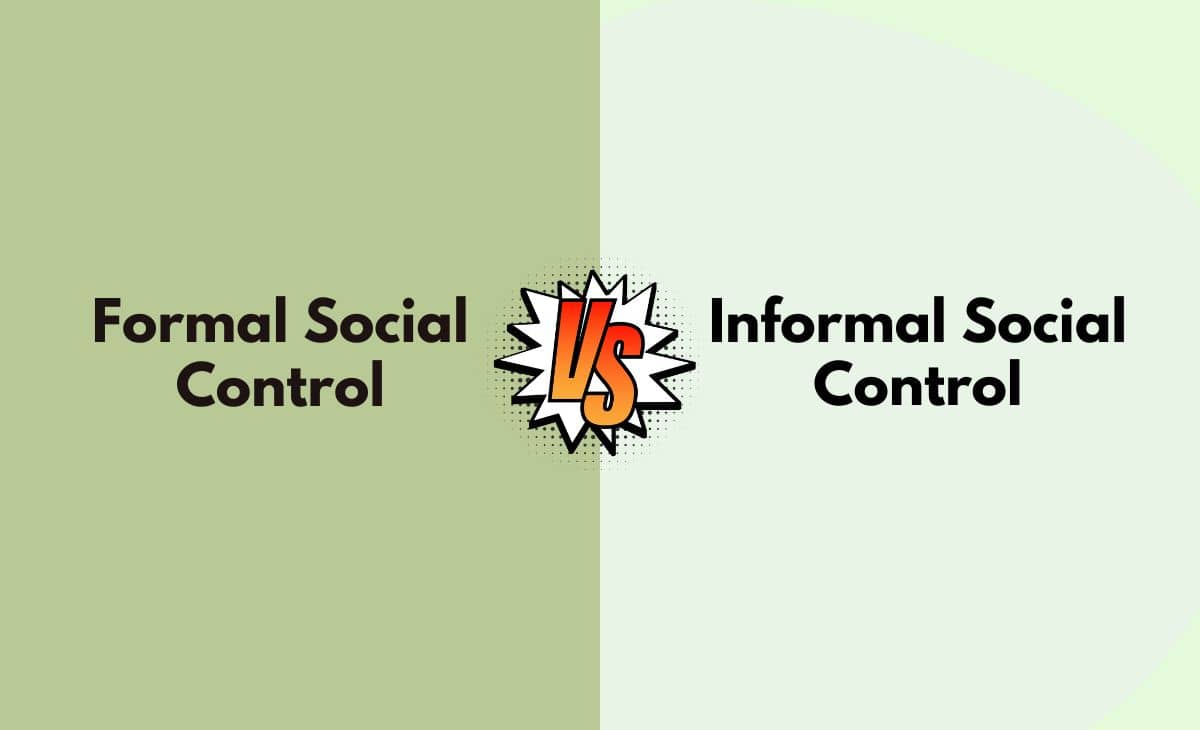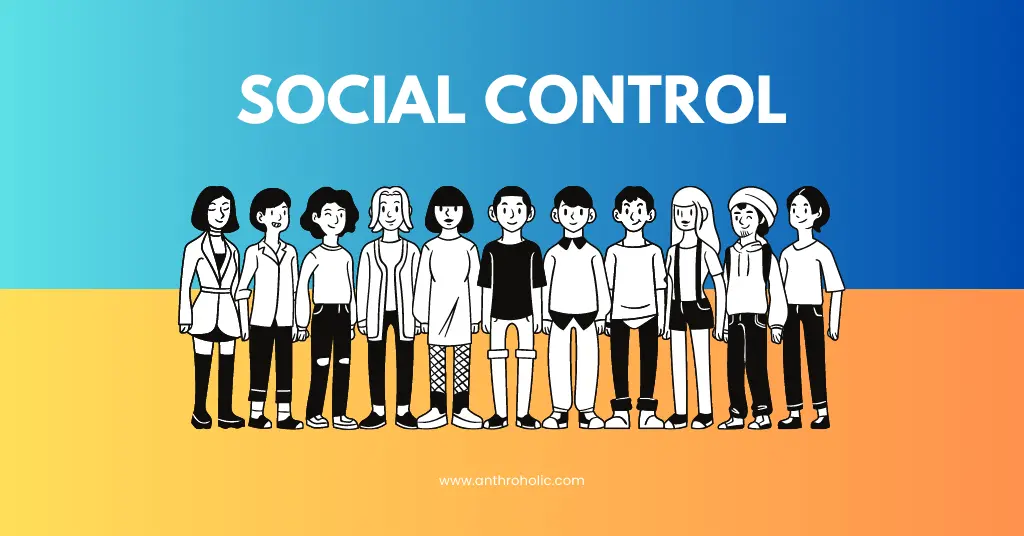Have you ever noticed how you instinctively adjust your behavior in different social settings? Perhaps you tone down your loud laughter at a library or choose your words carefully around a new acquaintance. These seemingly minute adjustments are the subtle workings of informal social control, the powerful but often unseen force that guides our actions and shapes our societies.

Image: www.diffzy.com
Informal social control, in essence, refers to the unwritten rules, norms, and expectations that govern our behavior within a community, group, or social circle. Unlike formal social control, implemented through laws and institutions like the police or courts, informal social control operates through social pressure, peer approval, and the fear of social disapproval. It’s the quiet whisper of societal expectations, the unspoken agreements that bind us together and ensure societal order, even without strict legal enforcement.
The Origins and Evolution of Informal Social Control
From Ancient Tribes to Modern Societies
Informal social control is as old as humanity itself. Our ancestors, living in small, tight-knit communities, relied heavily on informal norms to maintain harmony and ensure survival. Reputation, trust, and social approval were paramount, serving as a powerful deterrent against deviance. As societies evolved, so did the mechanisms of informal social control, adapting to the changing needs and complexities of social life.
The Rise of Communities and Social Networks
With the emergence of larger and more diverse communities, informal social control became more intricate. Families, neighborhoods, social groups, and religious institutions all played a role in shaping individuals’ behavior and reinforcing community values. The development of social networks, both online and offline, has further amplified these influences, creating new opportunities for social control and influencing individual choices.

Image: anthroholic.com
The Mechanisms of Informal Social Control
1. Social Norms: The Foundation of Behavior
Social norms, the unwritten rules that dictate expected behavior in specific social contexts, form the bedrock of informal social control. Whether it’s queuing politely at the supermarket or refraining from using offensive language in a professional setting, these norms guide our actions and shape our perception of appropriate behavior. Failure to adhere to these norms can lead to social sanctions, ranging from mild disapproval to ostracism.
2. Gossip and Rumor: The Power of Informal Sanctions
Gossip and rumor can be potent tools of informal social control. They can spread quickly, shaping public opinion and influencing individuals’ behavior. The fear of negative gossip or the desire to maintain a positive reputation can be a powerful motivator for conformity. In many communities, a whispered word can carry more weight than any formal punishment.
3. Peer Pressure: The Influence of the Group
Peer pressure is a prominent form of informal social control, particularly during adolescence and young adulthood. Individuals strive to fit in, gain acceptance, and avoid social rejection. This pressure can influence everything from fashion choices and music preferences to academic performance and even risky behavior. Sometimes, peer pressure can be positive, encouraging individuals to engage in prosocial behavior, while other times, it can lead to negative consequences.
4. Shame and Guilt: The Internalized Police
Shame and guilt, deeply rooted emotions that arise from a perceived violation of social norms, play a significant role in informal social control. These internalized sanctions can be more powerful than external punishments, as they evoke a sense of personal responsibility and a desire to make amends. A guilty conscience can be a powerful motivator for individuals to conform to social expectations and avoid causing further harm.
5. Social Rewards: Positive Reinforcement
Beyond punishment, informal social control also relies on positive reinforcement. Social rewards, such as praise, approval, and recognition, can encourage individuals to engage in desired behaviors and strengthen their commitment to social norms. A sense of community belonging, the feeling of being accepted and valued, can be a powerful motivator for maintaining socially acceptable behavior.
Examples of Informal Social Control in Action
1. The Power of Fashion
Fashion serves as a powerful example of informal social control. Trends, dictated by societal norms and peer pressure, influence what people wear, pushing them towards certain styles and away from others. Adherence to these trends can lead to social acceptance, while deviating from them can result in exclusion or disapproval. The changing trends of fashion demonstrate how informal social control can evolve and adapt over time.
2. The Ethics of Social Media
Social media platforms have created new avenues for informal social control. Online communities, groups, and influencers shape public opinion and influence individual choices through social pressure, trends, and viral content. The fear of being “canceled” or facing online backlash can be a powerful motivator for individuals to conform to the norms of their online communities.
3. The Morality of Food
The food we eat is subject to strong informal social control. Dietary norms, often influenced by cultural traditions, religious beliefs, and health concerns, dictate what is considered acceptable or unacceptable to consume. For example, vegetarianism or veganism, once considered fringe lifestyles, are now increasingly embraced due to changing social norms and ethical considerations.
Informal Social Control: Advantages and Disadvantages
Advantages
- Efficiency and Flexibility: Informal social control is often more efficient and flexible than formal systems. It can adapt quickly to changing social needs and enforce norms without requiring strict legal sanctions.
- Promotes Harmony and Cooperation: By discouraging disruptive behavior and encouraging cooperation, informal social control can foster a sense of community and social order. It helps individuals understand and internalize societal expectations, leading to smoother interactions.
- Reduces the Need for Formal Enforcement: Informal social control can alleviate the burden on formal institutions like the police and courts by effectively mitigating minor offenses and promoting voluntary compliance with social norms.
Disadvantages
- Social Conformity and Lack of Individuality: Informal social control can lead to excessive conformity and stifle individuality. The fear of social disapproval can discourage people from expressing their true selves or challenging dominant norms.
- Potential for Discrimination and Exclusion: Informal social control can be used to reinforce social hierarchies and promote discrimination against minority groups or individuals who deviate from dominant norms. This can lead to social exclusion and reinforce inequalities.
- Lack of Transparency and Accountability: Unlike formal systems, informal social control operates in a less transparent and accountable manner. This can make it difficult to challenge unjust norms or hold individuals accountable for enforcing them.
The Future of Informal Social Control
As technology continues to reshape our social fabric and globalization fosters ever-increasing diversity, informal social control will likely continue to evolve. Social media platforms, with their power to amplify voices and disseminate information, will likely play a more prominent role in shaping norms and influencing behavior. Moreover, the growing awareness of social injustices and the rise of movements for social change will challenge existing norms and reshape the landscape of informal social control.
Informal Social Control
Conclusion
Informal social control, the unseen force that guides our behavior, plays a vital role in our social lives. While it can be a force for good, promoting cooperation and social order, it also carries the potential for negative consequences, such as promoting conformity and discrimination. Understanding the complexities of informal social control is crucial for navigating the social landscape, promoting inclusive societies, and ensuring that social norms serve the interests of everyone.
As you go about your day, take a moment to observe the subtle cues and unspoken expectations that shape your interactions. Consider the influence of peer pressure, the power of gossip, and the impact of social rewards. By becoming more aware of the mechanisms of informal social control, we can navigate its influences more consciously and work towards creating a more equitable and just world for all.






